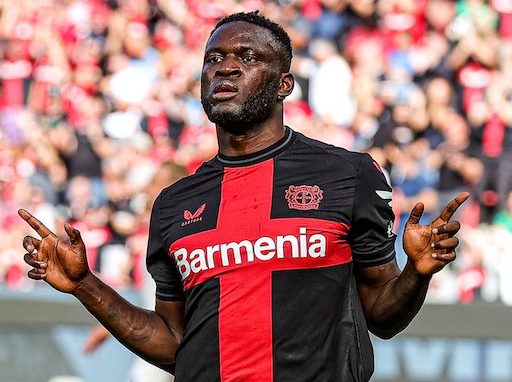Victor Boniface, the Nigerian striker for Bayer Leverkusen, etched his name into the DFB-Pokal quarterfinals narrative with a dramatic match-winning goal against 1. FC Köln. Leverkusen, trailing 2-0, mounted a stunning comeback, ignited by Patrik Schick’s two goals that leveled the score in stoppage time. With the game heading into extra time, Boniface, who had entered as a substitute, seized his moment. In the 98th minute, he connected with a perfectly placed cross from Alejandro Grimaldo, volleying the ball into the net for the decisive 3-2 lead. While Köln attempted to equalize late in extra time, their goal was disallowed for offside, securing Leverkusen’s passage to the semi-finals. The victory sparked jubilant reactions, particularly from Nigerian fans and the Super Eagles’ official social media account, who hailed Boniface’s impactful performance as a “super sub”. Leverkusen themselves celebrated with a playful social media post referencing his goal-scoring prowess. The victory showcased Boniface’s ability to deliver under pressure, proving his value as a clutch player. Coach Xabi Alonso praised the team’s resilience and fighting spirit, emphasizing their determination to push for victory until the final whistle, despite not playing their best game.
This dramatic victory came amidst a backdrop of recent online criticism directed at Boniface. Days prior to the match, a Nigerian lady on a popular podcast, known as @getacupoftea, had questioned his talent and dedication to his football career. She criticized his online presence, suggesting that his focus on social media posts, including humorous memes and giveaways, was detrimental to his performance on the field. She further argued that he lacked significant achievements, especially on the international stage. These comments sparked a wave of online reactions, both in support and against the player.
Boniface, however, chose not to remain silent. In response to the podcast’s claims, he exposed a private conversation with @getacupoftea where she had previously expressed admiration for his skills and even requested one of his jerseys. This revelation, which quickly circulated online, highlighted the perceived contradiction in her public criticism and seemingly private support. The leaked chat caused a significant backlash against the critic, with many accusing her of double standards and insincerity.
Undeterred by the backlash, @getacupoftea maintained her critical stance on social media. Following the DFB-Pokal match, she continued to ridicule Boniface’s sense of humor and footballing abilities via her Instagram stories. This ongoing exchange between the critic and the footballer added another layer to the unfolding narrative. It showcased the dynamics of online scrutiny and the athlete’s response to it.
While the initial criticisms aimed to downplay Boniface’s abilities, his match-winning performance served as a powerful rebuttal. The goal not only propelled Leverkusen to the semi-finals of a major tournament but also underscored Boniface’s impact on the pitch. It showcased his ability to rise above distractions and deliver when it matters most. His composure under pressure and clinical finish further solidified his reputation as a valuable asset for his club.
The contrasting narratives of online criticism and on-field success create an intricate portrayal of the modern footballer. Boniface’s experience highlights the challenges players face navigating public perception, particularly in the age of social media. His response to the criticism, both by revealing the private conversation and by letting his performance speak for itself, provides insight into how athletes manage external pressures and expectations.
The incident also sparks a broader conversation about the role of criticism and fandom in sports. While constructive feedback can be beneficial, the line between fair assessment and personal attack can often blur in the online sphere. Boniface’s situation highlights the potential pitfalls of public judgment and the need for responsible dialogue within the sporting community. The ongoing exchange between the critic and the footballer serves as a microcosm of the complex relationship between athletes and their audiences.














